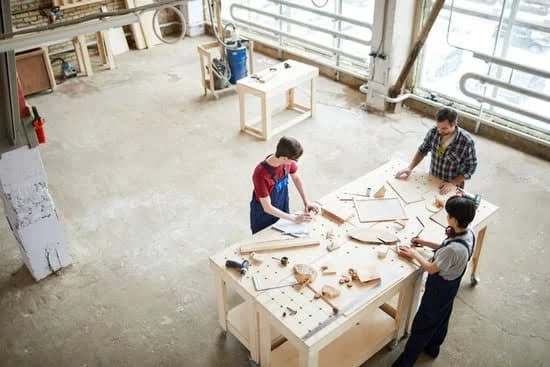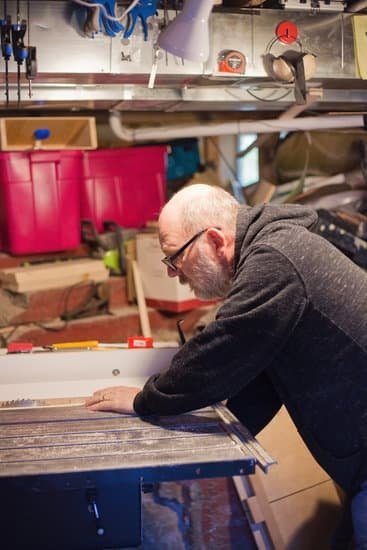Are you a woodworker looking to build or upgrade your woodworking bench? The type of wood you choose is a crucial decision that can impact the strength, durability, and workability of your bench. Understanding the importance of selecting the right wood for your woodworking bench is essential to ensure that it meets your needs and lasts for years to come.
When it comes to building a woodworking bench, the choice of wood can make all the difference in its overall performance and longevity. From the type of wood to its characteristics and environmental considerations, there are several factors to consider when making this decision.
In this article, we will explore the characteristics of ideal wood for a woodworking bench, common types of wood used, exotic wood options, softwood vs. hardwood pros and cons, as well as tips for maintaining and protecting your woodworking bench.
By understanding these key aspects of choosing the right wood for your woodworking bench, you will be equipped with the knowledge needed to make an informed decision that best suits your budget, availability, and purpose for the bench. Whether you’re a beginner or an experienced woodworker, knowing what wood to use for a woodworking bench is essential in creating a sturdy and functional workspace for all your projects.
Characteristics of Ideal Wood for Woodworking Bench
When it comes to choosing the right wood for your woodworking bench, there are several important characteristics to consider. The ideal wood for a woodworking bench should exhibit strength, durability, and workability, as these qualities directly impact the functionality and longevity of the bench. Understanding these characteristics is crucial in making an informed decision on which type of wood to use for your woodworking bench.
Strength
The strength of the wood is a key consideration when selecting material for a woodworking bench. The bench needs to be able to withstand heavy loads and constant use without warping or breaking. Hardwood species such as oak, maple, beech, and ash are known for their exceptional strength, making them popular choices for woodworking benches. These woods have a high density and parallel grain structure that contribute to their strength and stability.
Durability
Durability is another important characteristic to look for in wood used for a woodworking bench. The ability of the wood to resist wear, dents, and scratches over time is essential for maintaining the integrity of the bench.
Hardwoods like oak and maple are revered for their durability, as they are less susceptible to damage compared to softer woods. Additionally, certain exotic woods like teak and mahogany offer exceptional durability due to their natural oils that make them resistant to moisture and insect damage.
Workability
Workability refers to how easily the wood can be shaped, cut, drilled, and joined during the construction of the woodworking bench. While hardwoods are known for their strength and durability, they can also be more challenging to work with due to their density. However, with proper tools and techniques, hardwoods can be shaped into sturdy and long-lasting benches. Alternatively, some softwood species like pine may offer better workability while still providing sufficient strength for a woodworking bench.
Considering these characteristics will help you make an informed decision on what wood to use for your woodworking bench based on its intended use and desired lifespan.
Common Types of Wood Used for Woodworking Bench
When it comes to choosing the right wood for your woodworking bench, there are several common types of wood that are often considered due to their favorable characteristics. Whether you’re a seasoned woodworker or just starting out, understanding the qualities of different types of wood can help you make an informed decision. Here are some of the most commonly used woods for woodworking benches:
Some common types of wood used for woodworking benches include:
1. Oak: Known for its strength and durability, oak is a popular choice for woodworking benches. It is also readily available and relatively affordable, making it a practical option for many woodworkers.
2. Maple: Maple is another popular choice due to its fine grain and stability. It is also known for being easy to work with, making it ideal for constructing a sturdy and reliable woodworking bench.
3. Beech: Beech is valued for its toughness and resistance to wear, making it an excellent choice for heavy-duty use in woodworking benches. It’s also relatively inexpensive, making it an attractive option for those on a budget.
4. Ash: Ash is known for its excellent bending capabilities and shock resistance, making it a suitable choice for woodworking benches where durability is essential.
These common types of wood offer a combination of strength, durability, and workability that make them well-suited for creating solid and reliable woodworking benches that can withstand years of heavy use.
In addition to these common types of wood, exotic woods such as teak, mahogany, and rosewood are also options to consider when building a woodworking bench. Each type of wood offers unique qualities that may be desirable depending on your specific needs and preferences. Ultimately, the best wood choice for your woodworking bench will depend on factors such as budget, availability, and the intended purpose of the bench.
Exotic Wood Options for Woodworking Bench
When it comes to choosing the right wood for your woodworking bench, you may want to consider some exotic options that offer unique and desirable characteristics. Exotic woods such as Teak, Mahogany, and Rosewood are known for their stunning appearance, durability, and resistance to wear and tear. Let’s take a closer look at these exotic wood options and what makes them stand out for woodworking benches.
Teak
Teak is a highly sought-after wood for woodworking benches due to its natural oils that make it resistant to rot, decay, and insects. This tropical hardwood is known for its beautiful golden-brown color and tight grain, making it not only visually appealing but also incredibly durable. Teak is also famous for its ability to withstand extreme weather conditions, making it an excellent choice for outdoor woodworking benches.
Mahogany
Mahogany is another popular choice for woodworking benches due to its rich reddish-brown color and straight grain. This exotic wood is prized for its strength, stability, and workability, making it a favorite among woodworkers. Mahogany is also known for its resistance to termites and decay, making it an ideal option for long-lasting woodworking benches.
Rosewood
Rosewood is a luxurious exotic wood that is highly valued for its unique dark brown or reddish-purple color with black streaks. This dense and durable wood offers exceptional stability and a smooth finish, making it a top choice for fine furniture and high-quality woodworking benches. While rosewood can be more challenging to work with due to its hardness, the end result is often well worth the effort.
These exotic wood options offer exceptional qualities that make them stand out as excellent choices for woodworking benches. However, it’s essential to consider factors such as availability and budget when deciding which wood will best suit your needs. Whether you choose Teak, Mahogany, or Rosewood, each of these exotic woods can add a touch of elegance and durability to your woodworking bench project.
Softwood vs Hardwood
When it comes to choosing the right wood for your woodworking bench, one of the key decisions you’ll need to make is whether to use softwood or hardwood. Each type of wood has its own pros and cons that can greatly impact the performance and longevity of your bench.
Softwood, such as pine or cedar, is generally more affordable and readily available compared to hardwood. It is also easier to work with due to its lower density, making it ideal for beginners or those who plan to do a lot of shaping and cutting. However, softwood is also more prone to dents and scratches, which may not be suitable for heavy-duty woodworking projects.
On the other hand, hardwoods like oak, maple, or beech are known for their strength and durability. They are less likely to dent or scratch, making them ideal for heavy use in a woodworking setting. Hardwood also has an attractive grain pattern and tends to take stains and finishes well, resulting in a beautiful aesthetic for your bench. However, hardwood can be more expensive and harder to find in certain areas.
In terms of environmental considerations, many hardwoods come from slow-growing trees that may not be sustainable if over-harvested. Softwoods tend to come from faster-growing trees that are often more sustainable. Therefore, if eco-friendliness is important to you when choosing the wood for your woodworking bench, this may factor into your decision as well.
| Wood Type | Pros | Cons |
|---|---|---|
| Softwood | Affordable; easy to work with | Prone to dents and scratches; may not be suitable for heavy-duty use |
| Hardwood | Strength and durability; attractive grain pattern; | More expensive; harder to find in certain areas; |
Environmental Considerations
When it comes to choosing the right wood for your woodworking bench, environmental considerations play a crucial role. Making sustainable and eco-friendly wood choices not only benefits the environment, but also ensures the longevity and quality of your workbench. Here are some options for sustainable and eco-friendly wood choices:
- Bamboo: Bamboo is a highly sustainable option as it is a rapidly renewable resource. It is also incredibly strong and durable, making it an excellent choice for woodworking benches.
- Reclaimed Wood: Using reclaimed wood not only adds character to your woodworking bench, but it also helps in reducing the demand for new timber. Look for salvaged lumber from old buildings or structures to give your workbench a unique and environmentally friendly touch.
- Cedar: Cedar is known for its natural resistance to decay and insects, making it a long-lasting option for your woodworking bench. It is also a sustainably harvested wood, making it an eco-friendly choice.
In addition to these options, you can also consider looking for wood that is certified by organizations such as the Forest Stewardship Council (FSC). FSC-certified wood ensures that the timber has been responsibly harvested from sustainably managed forests.
Ultimately, when choosing wood for your woodworking bench, consider the impact on the environment and opt for materials that align with sustainable practices. By using eco-friendly wood choices, you can contribute to conservation efforts while enjoying a high-quality workbench.
Factors to Consider When Choosing Wood for Woodworking Bench
When it comes to choosing the right wood for your woodworking bench, there are several factors to consider that can help guide your decision. One of the most important factors is your budget.
Different types of wood come with different price points, so it’s essential to determine how much you are willing to invest in the wood for your bench. While some types of wood may be more expensive, they may also offer greater durability and longevity, ultimately providing better value in the long run.
Availability is another crucial factor to consider when choosing wood for your woodworking bench. Some types of wood may be readily available in your area, making them a convenient and cost-effective option. On the other hand, if you have your heart set on a specific type of wood that is not easily accessible, you may need to explore special ordering options or consider alternative choices.
The purpose of your woodworking bench should also influence your choice of wood. If you anticipate heavy use and want a durable surface that can withstand wear and tear, opting for a harder wood like oak or maple may be the best choice. However, if you prioritize workability and flexibility for intricate woodworking projects, a softer wood like pine or cedar could be more suitable.
Considering these factors can help you make an informed decision about what wood to use for your woodworking bench, ensuring that it meets both your practical needs and personal preferences. Ultimately, finding the right balance between budget, availability, and purpose will lead to a satisfying woodworking experience with a well-suited bench at its center.
Tips for Maintaining and Protecting Your Woodworking Bench
Maintaining and protecting your woodworking bench is crucial in order to ensure its longevity and functionality. Proper care and maintenance can significantly prolong the life of your bench, keeping it in top condition for years to come. One of the most important aspects of maintaining a woodworking bench is choosing the right finishing and sealants for the type of wood used.
When considering what wood to use for a woodworking bench, it’s essential to also think about how you will finish and seal the wood. Different types of wood will require different finishes and sealants based on their characteristics.
For example, hardwoods like oak, maple, beech, and ash may require different treatment compared to softwoods like pine or cedar. It’s important to research and understand the specific needs of the wood you choose in order to determine the best finishing and sealing options.
Once you have applied the appropriate finishing and sealants to your woodworking bench, it’s essential to establish a regular maintenance routine. This routine may include cleaning the surface regularly, reapplying finishes as needed, and addressing any wear or damage that occurs over time. By sticking to a consistent maintenance routine, you can prevent potential damage and keep your woodworking bench looking and functioning at its best.
In addition to maintaining your woodworking bench with proper finishing, sealants, and regular upkeep, it’s also important to protect it from environmental factors such as moisture, direct sunlight, or extreme temperature changes. By taking these environmental considerations into account and implementing preventative measures, you can ensure that your woodworking bench remains in optimal condition for many years of use ahead.
Conclusion
In conclusion, choosing the right wood for your woodworking bench is essential to ensure its strength, durability, and workability. The ideal wood for a woodworking bench should be able to withstand heavy use, resist moisture and wear, and provide a stable surface for various woodworking tasks.
With the understanding of the characteristics of different types of wood, as well as the pros and cons of softwood versus hardwood options, you can make an informed decision on what wood to use for your woodworking bench.
When considering common types of wood such as oak, maple, beech, and ash, or exploring exotic options like teak, mahogany, and rosewood, it’s important to weigh the factors of budget, availability, and purpose. Additionally, taking into account environmental considerations by choosing sustainable and eco-friendly wood choices can also contribute to making an ethical and responsible decision for your woodworking bench.
Maintaining and protecting your woodworking bench is equally important in ensuring its longevity. This includes applying the appropriate finishing and sealants to prevent warping or damage from moisture or other elements. By following a regular maintenance routine, you can extend the lifespan of your woodworking bench regardless of the type of wood chosen. Ultimately, with careful consideration and proper care, you can make the best wood choice for your woodworking bench that suits your needs and preferences.
Frequently Asked Questions
What Is the Best Wood for a Woodworking Bench?
The best wood for a woodworking bench is one that is durable and sturdy, such as hard maple, oak, or beech. These woods can withstand the wear and tear of woodworking tools and provide a stable surface for projects.
What Is the Best Lumber to Use for a Bench?
When choosing lumber for a bench, it’s important to consider the strength and stability of the wood. Hardwoods like oak, maple, or cherry are popular choices due to their durability and resistance to wear. Softwoods like pine or cedar can also be used but may not be as durable in the long run.
What Wood Is Used for Bench?
Various types of wood can be used for benches depending on the desired look and function. Common options include oak, cherry, maple, pine, and cedar. Each type of wood has its own unique characteristics that can complement different styles and purposes of benches. Ultimately, the choice of wood will depend on factors such as budget, aesthetics, and durability needs.

Hi everyone! I’m a woodworker and blogger, and this is my woodworking blog. In my blog, I share tips and tricks for woodworkers of all skill levels, as well as project ideas that you can try yourself.





